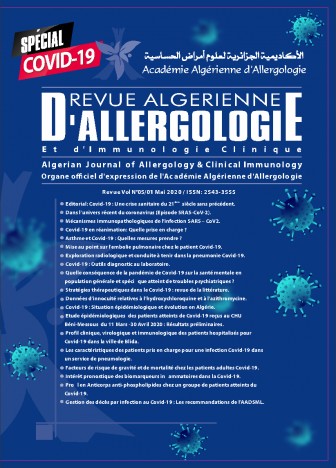REVUE ALGERIENNE D’ALLERGOLOGIE ET D'IMMUNOLGIE CLINIQUE
Volume 9, Numéro 2
19/12/2024
Spectre En Auto Anticorps Au Cours Du Syndrome De Gougerot Sjögren
Auteur :
Gharbi Keltoum
Résumé
Résumé: Introduction : Le syndrome de Gougerot-Sjögren (SGS) est une exocrinopathie auto-immune engendrant un syndrome sec essentiellement oculaire et buccale associé à un terrain dysimmunitaire marqué par la présence d’autoanticorps antinucléaires et par l’envahissement lymphocytaire des différentes glandes muqueuses de l’ organisme notamment salivaire . Méthodes : Il s’agit d‘une étude rétrospective réalisée au laboratoire d’immunologie (CHU de Annaba, Algérie), ayant porté sur 25 patients suivis pour syndrome de Gougerot-Sjögren, diagnostiqués selon les critères diagnostiques de l’American Congres of Rheumatology and European League Against Rheumatism (ACR/EULAR) (2016). Résultats : Sur les 25 patients recensés, les anticorps antinucléaires étaient positifs chez 23 cas, soit 92%.Les anticorps anti-antigènes nucléaires solubles (ENA) étaient présents chez la totalité des patients avec des anticorps anti- SSA dans 25 cas (100%) et des anticorps anti- SSB positifs dans 11 cas (44%) . L’étude de l’association des deux autoanticorps a montré que les anti-SSA et anti-SSB étaient retrouvés associés chez 11 cas soit 44% des patients. Conclusion : Nos résultats ont confirmés l’importance de la recherche des anticorps anti –SSA et anti -SSB au cours du SGS et leur utilité comme outils de diagnostic. Abstract Introduction : Gougerot-Sjögren syndrome (GSS) is an autoimmune exocrinopathy causing a dry syndrome mainly ocular and oral associated with a dysimmune terrain marked by the presence of autoantibodies antinuclear cells and by lymphocyte invasion of the various mucous glands of the body especially saliva. Methods : This is a retrospective study carried out at the immunology laboratory (Annaba University Hospital, Algeria), involving 25 patients followed for Gougerot-Sjögren syndrome, diagnosed according to the diagnostic criteria of American Congress of Rheumatology and European League Against Rheumatism (ACR/EULAR) (2016). Results: Of the 25 patients identified, Antinuclear antibodies were positive in 23 cases, i.e. 92%. Anti-nuclear soluble antigen antibodies (ENA) were present in all patients with anti-SSA antibodies in 25 cases (100%) and antibodies anti-SSB positive in 11 cases (44%). The study of the association of the two autoantibodies showed that the anti-SSB and anti-SSA. Anti-SSB were found associated in 11 cases or 44% of patients. Conclusion: Our results confirmed the importance of the search for anti-SSA and anti-SSB antibodies during SGS and their usefulness as tools diagnosis.
Mots clés
Anti-SSA Anti-SSB; Gougerot-Sjögren ; xérophtalmie ; xérostomie ; ; Anti-SSA; ; Anti-SSB; ; Gougerot-Sjögren ; ; xérophtalmie ; ; xérostomi
